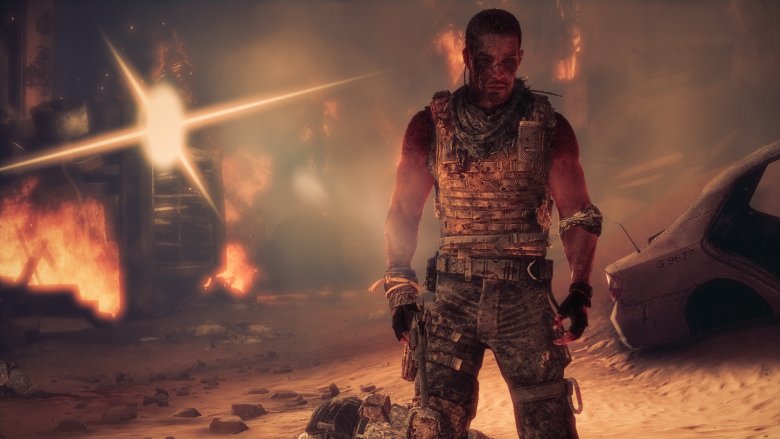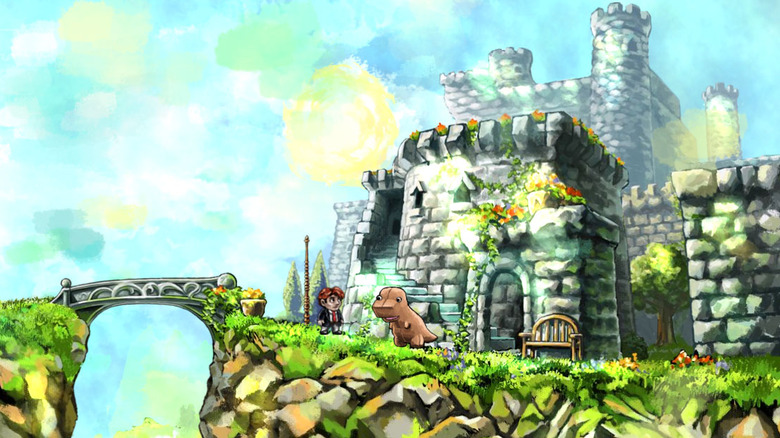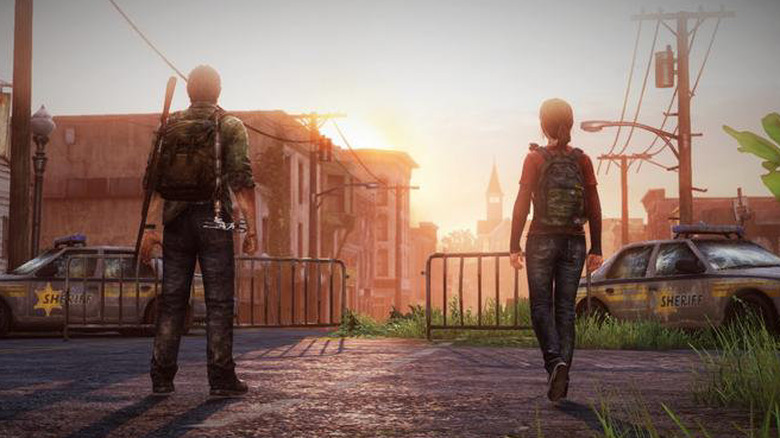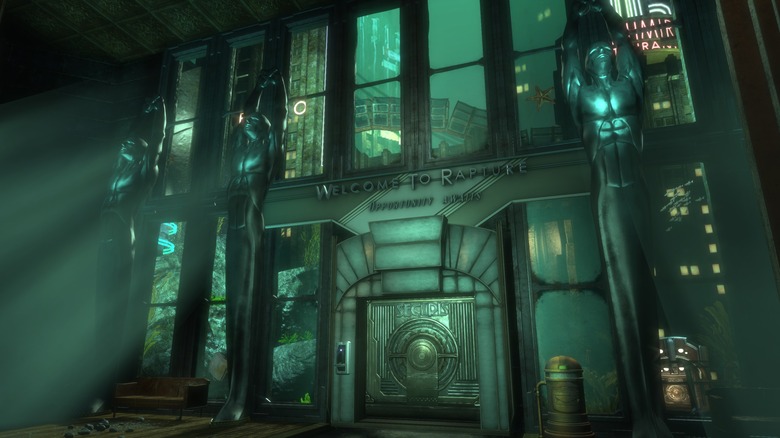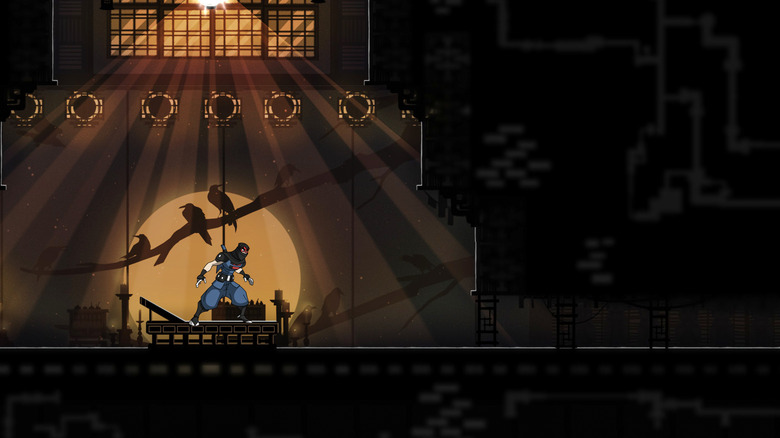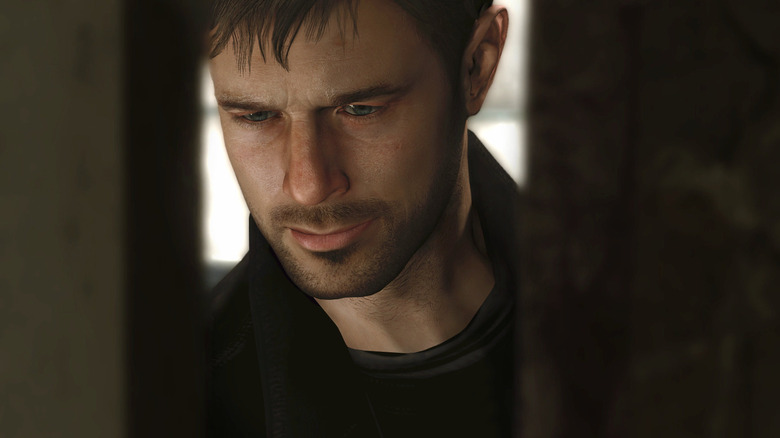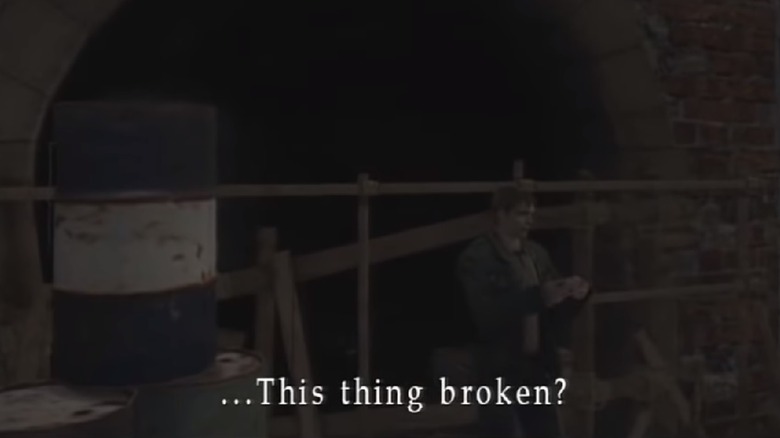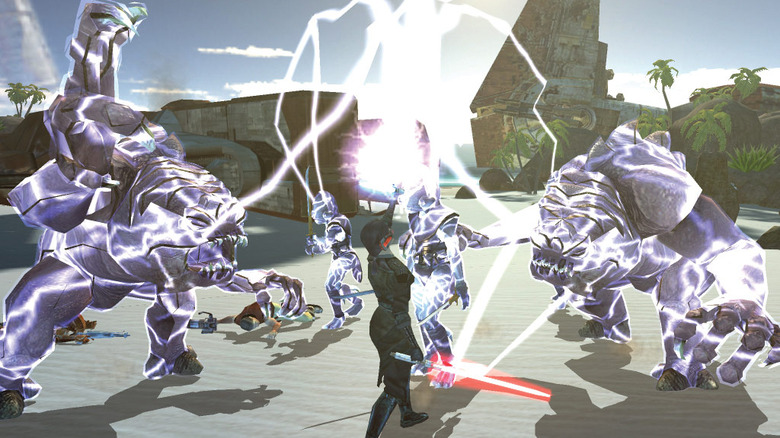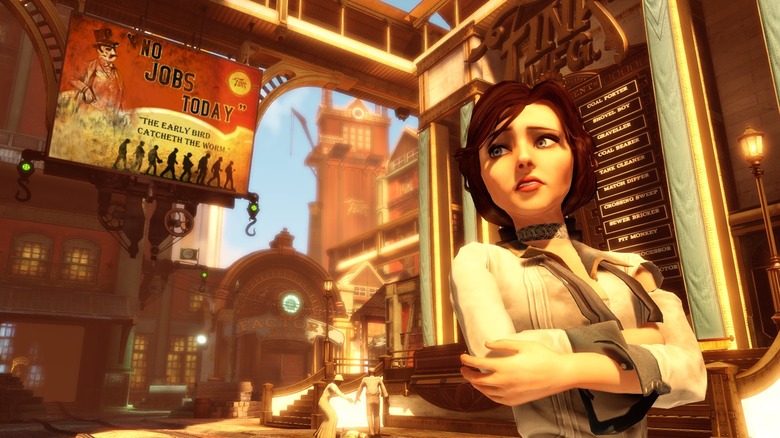Games That Trick You Into Being The Bad Guy
Video games are full of stories where you get to be the hero, the chosen one, the savior of everything. Some offer an alternative: play as an unstoppable evil force, cultivating death and destruction as you savage the world, crushing every pitiful "good guy" who tries to stop you.
Some games, however, pull off a masterful bit of storytelling: they fool you into thinking you're saving the day before revealing the ugly truth. These games use a variety of techniques into deceiving the player into acting as the bad guy. Sometimes, it's insanity or hallucinations that fool both you and the character. Other times, there is a "big bad" behind the scenes pulling your strings. Whatever method is being used, if done right, this turning of the tables can be one of the most effective storytelling techniques available to a game.
Today, we're looking at some classic games that trick you into playing as the bad guy. Consider this your spoiler warning.
Braid shows you your character's true intent at the very end
Braid is a masterfully designed puzzle game. It seems like a simple Mario clone, where you jump on mindless enemies in order to reach the end of each stage. However, there is a time travel mechanic that allows you to rewind certain aspects of the world, and makes for some truly mind-bending late game situations. The final level's twist (and the story's lore-based symbolic meaning) truly elevates Braid beyond its platforming nature.
Throughout Braid, your goal is to rescue the princess. She was kidnapped by a "terrible monster" and, just like Mario, your goal is to rescue her. When you reach the final stage, however, you realize the horrible truth: YOU are the monster the princess is running from. The end of the game reveals that the princess is actually laying traps for you, as you rewind time in order to thwart them. Meanwhile, the big, burly knight you thought was kidnapping her is actually rescuing her. From you. It's a heady reveal that makes you instantly want to play through again and look for clues.
In Shadow of the Colossus, you only fight the innocent
We're going right for the jugular with this one. If you haven't played Shadow of the Colossus, you are doing yourself a great disservice. It's beautiful, original, and features one of the most unsettling story reveals of all time. Even though this game released over a decade ago, people still regularly write about how much it messed with their heads when they "figured it out." How much do you want a game to punch you in the gut with its ending?
In Shadow of the Colossus, your character is tasked with traveling the land and slaying massive beasts in order to save the world and the one you love. Sounds like a pretty typical hero's story, right? Not so fast.
Reach the final Colossus, and the soundtrack begins playing a depressing, almost funeral-like song. Gone are the epic, sweeping strings you've grown accustomed to. It isn't long before the final beast is felled, and the ending plays out: the Colossi you have slain were actually holding back an evil force named Dormin, who tempted you into destroying them so he could regain his power and unleash himself upon the world. All thanks to you. Nice work.
IGN also writes that the ending of Shadow of the Colossus ties into another beautiful game by the same developer: Ico. These are two powerful games you don't want to miss.
The Last of Us makes you pay a terrible price
The Last of Us is yet another haunting and beautiful game. You play as Joel, a man who loses everything before the game begins and sees no real reason to continue existing in the post-apocalyptic setting of the game. Joel must claw his way back from the darkness, and he is given that chance when he encounters Ellie. The two fight to survive against a slew of horrific enemies, bonding with one another and becoming as close as a father and daughter.
It seems heartwarming when Joel battles against a group of people called the Fireflies in order to rescue Ellie from certain death. He gets a chance to make up for his past failures and rescue his "daughter," atoning for what he sees as the greatest sin of his past.
It's cheating a little bit here, but you really have to stop and think about the implications of The Last of Us' ending. Ellie is immune to the disease that has practically wiped out humanity, and the Fireflies were going to attempt to create a vaccine based off of her immunity. By wiping them out and taking Ellie away, you save her life. You may also be dooming humanity, as Ellie may have been the last chance to develop a cure. To answer this Reddit post: no, you aren't the only one.
BioShock's big reveal is a nasty blow to the head
If you haven't finished BioShock, would you kindly go do that real quick? Thanks.
Good, you're back. Probably the granddaddy of modern gaming twists, the big reveal in BioShock that you've really been a pawn of Andrew Ryan and Frank Fontaine, who have been using a hypnotic command phrase to control you in their war against one another. As you make your way towards Andrew Ryan and it begins to dawn on you that the two have been using you with the subliminal phrase "Would you kindly," you become aware of how much evil you have committed and how much destruction you have brought to the underwater world of Rapture.
In many shooters, the only explanation for why you kill everyone in your path is because they would kill you if you didn't. BioShock takes that to an entirely different level, making you question the very nature of video games themselves, and why characters in them behave the way they do.
It's punctuated with a nauseating scene where you beat an old man to death with a golf club. You aren't given the choice. It's just something that you kindly need to do.
Mark of the Ninja presents you with two awful choices
Mark of the Ninja is an awesome stealth-action game from the criminally underrated Klei Entertainment. In it, you take control of a ninja, who must fight to save his clan against heavily armed mercenaries with his friend Ora. As the game progresses, your character receives more and more tattoos (hence the name of the game) that grant you magical powers and essentially turn you into an invisible killing machine by the end of the game.
However, as the game goes on, you start to figure out that everything may not be on the up and up. Your tingling spider-sense proves to be true: the tattoos are also slowly driving you insane. As your character slips into wilder hallucinations, you finally reach the end of the game and are presented with another jaw-dropper: Ora isn't real. She's just another hallucination.
You are given two options at this point: to commit ritual suicide by killing Ora (and thus, yourself), or to kill the master of your clan, who will just use the "mark of the ninja" on some other pawn. Either way, you have committed far too much murder to be considered a good guy. If you choose to kill your clan's leader, you also butcher the rest of your clan and become a mythical tyrant. So ... there's that.
Heavy Rain puts you in the shoes of a killer
Heavy Rain is a cerebral, disturbing game that tasks you with hunting down the Origami Killer, a kidnapper and murderer who targets young boys and drowns them. The game puts you in the shoes of four different characters throughout its runtime: Ethan Mars, whose son was kidnapped by the Origami Killer; Madison Paige, a woman with insomnia and a mysterious past; Norman Jayden, an FBI Agent with a drug addiction; and Scott Shelby, a private investigator. Heavy Rain frequently misleads you and presents you with plenty of red herrings, all while you attempt to identify the killer before he can murder Ethan's son.
As the mysteries of the game reveal themselves, you will frequently wonder if one of your characters is, in fact, the Origami Killer. It is eventually revealed that Shelby, who watched his own brother drown in childhood, is actually the elusive serial killer. Rather than tracking down the killer, Shelby's true purpose was to get close to his victims in order to cover up any evidence they may have collected against him. It makes for a fun replay of Heavy Rain when you know the Origami Killer's identity, as you can pick out little details that hint towards the inevitable.
Silent Hill 2 traps you in Hell for your crimes
The Silent Hill series is known for its metaphorical plots, and Silent Hill 2's story of James Sunderland is probably their most memorable. At the beginning of the game, James receives a letter from his wife, Mary, instructing him to meet her in the eponymous town. There's just one slight problem with this turn of events: Mary died three years prior to this event.
What follows is a terrible fever dream for James, who is constantly confronted with manifestations of his worst fears as he searches the town of Silent Hill for Mary. As the story unfolds, you start to suspect that the story of Mary's death is not entirely clear. When the big reveal occurs, it can make you a bit sick to your stomach. You shouldn't feel bad for the hellish torture James is going through.
In fact, he deserves it: the town of Silent Hill is a sort of purgatory, and James was called there because he actually murdered his wife. She was ill and he became sick of caring for her, so he suffocated her with a pillow. He deserves to be butchered by faceless nurses and sword-wielding monsters with pyramids for heads.
Well, either that, or it was all that damn dog's fault.
Star Wars: Knights of the Old Republic shows you that evil is more fun
There are sort of two reveals in Star Wars: Knights of the Old Republic along the lines of you actually being the baddie the whole time. One is the game's big twist: your character, the Force-powered insomniac, is actually Darth Revan, the central antagonist's long-lost Sith master. The Jedi captured and brainwashed your character to attempt to bring him over to the Light Side of the Force. In typical BioWare fashion, a series of incredibly obvious moral choices push you towards the Light or Dark side, which in turn affects your Force powers and which ending you receive.
Regardless of your choices, your character was a bad guy at one point; how you play the game will change whether or not he stays that way. However, The A.V. Club points out an important detail: KOTOR is kinda boring if you choose the Light Side of the Force. Your powers aren't as fun, your choices feel muted, and the ending is like a listless parade. They say this of KOTOR: "Evil is much more fun, says the ending of Knights Of The Old Republic, the rare game whose alternate conclusions demonstrate that the 'right' decision isn't the one you'll necessarily enjoy the most."
Next time you play through KOTOR, you know which way you want to play. Do not fail me again, Admiral.
BioShock Infinite makes you a megalomaniac
After BioShock's big twist, it seemed unlikely that the series could do it again.
Oh, hello there BioShock Infinite. Glad you could make it.
Whereas it would have been practically impossible to see the "Would you kindly?" twist coming, BioShock Infinite actually puts down plenty of breadcrumbs for its shocking finale. It seems unlikely that anyone playing through would be able to put everything together (check out Digital Spy's full recap of the ending to see just how impressive this game's storytelling is), but an awful lot clicks into place when you start to figure out just what connects your character, Booker, to both heroine Elizabeth and villain Comstock.
Booker is given the option to travel back and kill Comstock before he can commit his awful crimes, before he imprisoned Elizabeth, and before he built Columbia. You travel back to the moment that Comstock was "born," and realize that you, in fact, are Comstock. The only way to stop him is to allow yourself to be drowned in your past — which causes the screen to instantly go black. Roll credits.
Whereas the original BioShock's ending messes with you over time, Infinite's is jarring and horrifying, as you realize the implications of what your character has done to the world.
Spec Ops: The Line is a horrific retelling of Apocalypse Now
Most of these games reveal that the character you thought was the protagonist is actually an antagonist, but it takes a special plot to turn the player themselves into the central villain. The classic story in Spec Ops: The Line attempts to do just that: make the player question the very nature of shooters and the justification for killing so many people. It wraps it all up in a story of madness and scapegoating, with more than a little inspiration from film classic Apocalypse Now and its own inspiration, Heart of Darkness.
As you progress through Spec Ops, you figure out that there is something going on with your character, Walker. You know things aren't right, but it still manages to keep you at arm's length. When you reach the end and realize that Walker has been trying to justify his heinous actions, placing the blame on a (long-dead) Konrad by "following orders" of a hallucinated version of the man, you are left with one of the most devastating video game stories ever told. IGN said the ending "will haunt you." Polygon sat down with the creators of the game just to find out how they crafted such a brilliant, modern story.
There are a ton of interpretations of Spec Ops: The Line. In all of them, however, this fact remains: you are the true villain.

